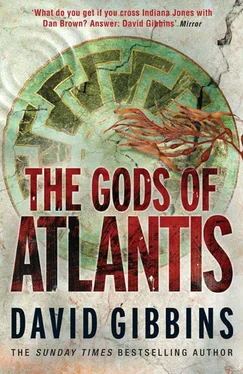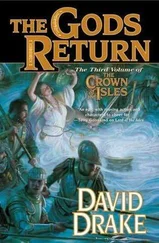David Gibbins - The Gods of Atlantis
Здесь есть возможность читать онлайн «David Gibbins - The Gods of Atlantis» весь текст электронной книги совершенно бесплатно (целиком полную версию без сокращений). В некоторых случаях можно слушать аудио, скачать через торрент в формате fb2 и присутствует краткое содержание. Жанр: Прочие приключения, на английском языке. Описание произведения, (предисловие) а так же отзывы посетителей доступны на портале библиотеки ЛибКат.
- Название:The Gods of Atlantis
- Автор:
- Жанр:
- Год:неизвестен
- ISBN:нет данных
- Рейтинг книги:3 / 5. Голосов: 1
-
Избранное:Добавить в избранное
- Отзывы:
-
Ваша оценка:
- 60
- 1
- 2
- 3
- 4
- 5
The Gods of Atlantis: краткое содержание, описание и аннотация
Предлагаем к чтению аннотацию, описание, краткое содержание или предисловие (зависит от того, что написал сам автор книги «The Gods of Atlantis»). Если вы не нашли необходимую информацию о книге — напишите в комментариях, мы постараемся отыскать её.
The Gods of Atlantis — читать онлайн бесплатно полную книгу (весь текст) целиком
Ниже представлен текст книги, разбитый по страницам. Система сохранения места последней прочитанной страницы, позволяет с удобством читать онлайн бесплатно книгу «The Gods of Atlantis», без необходимости каждый раз заново искать на чём Вы остановились. Поставьте закладку, и сможете в любой момент перейти на страницу, на которой закончили чтение.
Интервал:
Закладка:
To those early travellers the ocean was not a barrier but a conduit, the most important conclusion reached by the adventurer Thor Heyerdahl after completing his ‘Ra’ expeditions in 1970 using reed boats. He was referring to his experience on the Atlantic Ocean, where in the right place – sailing south from Gibraltar – it is difficult not to be swept westwards across the ocean, a voyage that would have been well within the technology of early Neolithic seafarers using reed, skin or wooden boats. Yet there is another aspect to early seafaring that new research on Neolithic religion brings to the fore. A sea voyage was the final journey in the dream world of Gilgamesh, his ultimate adventure; and watery visions, of water being an access point to the underworld and of floating in an endless ocean, are common altered-consciousness experiences. Among people who were sensitized to these experiences, a voyage such as one across the Atlantic could be perceived at a level of consciousness unfamiliar to those of us who have not been driven to hallucination – as many are when pushed to their limits at sea – or to interpret those visions within a system of ritual and belief that gave structure to the experience. I have tried to bring something of this across in the Prologue. To these early seafarers, reality may have merged with the spirit world; the sea voyage became a voyage of the mind. For those still steeped in the old religion – the religion of spirit journeys – ocean voyages may not have provoked terror, but actually have been relished.
It seems possible that for the greater part of the history of Homo sapiens, it has been this type of belief system, rather than belief in gods and deferential acts of worship, that has sustained people’s spiritual needs – a system built on remembering and rationalizing dreams, and on other altered-consciousness experiences that seemed to access a supernatural world, a system whose common features may owe much to human neuropsychology. The inception of religion with anthropomorphic gods may have gone hand-in-hand with early state formation and the burgeoning power-base of the new leaders, something we may see appearing with dramatic speed and conflicting with the old religion at the remarkable sites of the early Neolithic – at Catalhoyuk, Gobekli Tepe, Nevali Cori, Cayonu – over nine thousand years ago. As more early sites are discovered and excavated – one day perhaps including submerged sites off the Black Sea coast of Turkey, even a real-life Atlantis – it may truly be possible to speak of archaeologists making the greatest discovery of all time, and revealing the birthplace of the gods.
The swirling vortex images from the Neolithic may be the origin of two ancient symbols that have come to have dark connotations, the swastika – first seen on Bronze Age pottery of Troy – and the Sonnenrad, the sun symbol that Heinrich Himmler incorporated in the decoration of his SS ‘order-castle’ at Wewelsburg. There, the symbol was placed in the floor as if it were at the apex of an axis mundi, an idea that would have been well within Himmler’s mystical vision of Wewelsburg, and it was this that led me to imagine the Zoo flak tower in Berlin in similar terms.
The Zoo flak tower was one of the most terrifying German creations of the Second World War, a vast five-storey concrete bunker that rose like a castle keep out of the grounds of the Berlin Zoo. The tower provided shelter for thousands of civilians during bombing raids, and had its own power supply, water reservoir and hospital; in the final hours of the Russian onslaught, the defenders even dropped explosives off the parapet like medieval soldiers pouring burning oil on attackers. It was one of three flak towers in Berlin and was ready for action in April 1941, along with the adjacent L-Tower, which housed the radar that directed the flak (anti-aircraft) fire.
The main armament of the Zoo tower comprised four huge twin 128mm guns, each barrel capable of firing up to ten rounds a minute. The tower was designed with elasticity in the ferroconcrete to withstand the shock of the guns firing at high elevations, which drove the recoil force down into the structure; but damage was caused to the concrete as well as to the gun crews’ hearing when the guns were fired at low elevations, at ground targets. The flak towers shot down many British and American bombers, as well as Russian dive-bombers in the 1945 onslaught that were engaged by the 37mm and quadruple 20mm guns on the outer gallery below the parapet. During the final assault the big guns provided withering fire against infantry and tanks until the Soviets advanced below the minimum elevation of the guns, and the last German defenders outside the tower were overwhelmed.
Of great significance for this novel, the Zoo tower also provided safe storage for art and antiquities from numerous Berlin museums, held in special air-conditioned rooms on the third floor – among them the Egyptian bust of Nefertiti, the carved frieze from Pergamon in Turkey, Kaiser Wilhelm II’s collection of coins and, most famously, the ‘Treasure of Priam’, excavated by Heinrich Schliemann at Troy in 1873, donated by him to the German people before his death in 1890, and held until the the beginning of the Second World War in the Museum for Pre- and Early History in Berlin.
In March 1945, under orders from Hitler and overseen by Reichsleiter Martin Bormann, many of the treasures in the Zoo tower were removed to a salt mine at Merkers in Austria, where they were discovered soon after by soldiers of General Patton’s US Third Army. Three crates were left behind; those containing the treasure of Priam. We know this because the Treasure disappeared after the war and for many years was thought lost. The true course of events has only recently been reconstructed, and much remains uncertain. The director of the Museum for Pre- and Early History, Dr Wilhelm Unverzagt, an ardent Nazi, is thought to have insisted that the crates remain in Berlin when the other treasures were removed in March 1945, though whether or not there was a higher authority behind that decision – Himmler would be a likely candidate, with his interest in prehistory – remains unknown. Unverzagt is thought to have stayed in the Zoo tower with the crates after the 2 May surrender to ensure that they were not looted by Russian soldiers but instead remained intact for transport to Moscow, where they remained hidden in the storerooms of the Pushkin Museum until they were rediscovered in 1987.
In the novel, I imagine the ‘Schliemann Gallery’ in the Museum for Early and Pre-History being presided over by a statue bust of Otto von Bismarck, the ‘Iron Chancellor’, who had been a friend of Schliemann’s; my image of the broken statue in the Zoo tower is based on a real-life shattered statue of Bismarck photographed in 1945 in the town square of Rigorplatz, outside Berlin, and the fictional statue in turn inspires the fictional Hoffman to think of Ozymandias, the toppled statue of the king in Shelley’s poem who seems to stand for all the crumbled dreams of power that Hoffman would have seen around him in those dark days of April 1945.
The Zoo tower provided a headquarters for Josef Goebbels in his final guise as Reich Commissioner for the Defence of Berlin, though he himself did not leave the Fuhrerbunker in the days leading up to the murder of his children and his own suicide. The words and actions of Heinrich Himmler portrayed in this novel are fictional, including his appearance at the Zoo tower on the morning after Hitler’s suicide on 30 April 1945. Nevertheless, Himmler’s movements over the final days before the German surrender were secretive and shrouded in mystery, and allow the possibility of a clandestine visit to Berlin as suggested here. On 28 April 1945, the BBC had reported Himmler’s attempt to negotiate with the Western Allies, and the following day Hitler declared him a traitor and ordered his arrest. Late on 1 May, Himmler attempted to negotiate with Grand Admiral Donitz, Hitler’s appointed successor, for a place in the new government, and over the next days he followed Donitz and his puppet government from Plon to Flensburg on the Baltic. Despite being dismissed by Donitz on 6 May, Himmler continued to retain the trappings of power, driving round with an SS escort and maintaining an aircraft. He was finally arrested in disguise – wearing an eye patch, with his moustache shaved off – by the British, and committed suicide in custody using a cyanide capsule on 23 May.
Читать дальшеИнтервал:
Закладка:
Похожие книги на «The Gods of Atlantis»
Представляем Вашему вниманию похожие книги на «The Gods of Atlantis» списком для выбора. Мы отобрали схожую по названию и смыслу литературу в надежде предоставить читателям больше вариантов отыскать новые, интересные, ещё непрочитанные произведения.
Обсуждение, отзывы о книге «The Gods of Atlantis» и просто собственные мнения читателей. Оставьте ваши комментарии, напишите, что Вы думаете о произведении, его смысле или главных героях. Укажите что конкретно понравилось, а что нет, и почему Вы так считаете.












